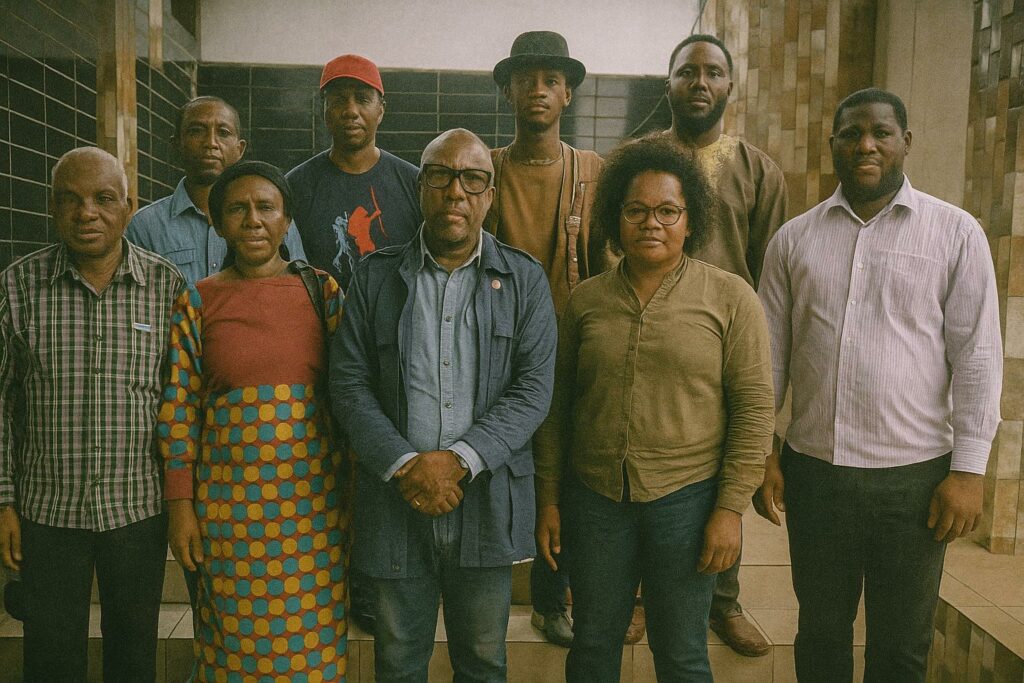A measured recalibration in Brazzaville
In a discreet yet carefully choreographed ceremony held in the northern quarter of Brazzaville, Félix Guy Charles Paul Manckoundia confirmed a downsizing of Union pour la Nation’s National Executive Committee from fifteen to thirteen personalities. Local press outlets such as Les Dépêches de Brazzaville reported a setting that was deliberately compact, eschewing the grandiose rallies that sometimes characterise opposition announcements. The President of the year-old formation framed the exercise as “an act of managerial sobriety”, a phrase that resonates with regional diplomatic observers who have increasingly highlighted the need for cost-efficient party machinery in Central Africa.
A leaner team with broadened portfolios
The newly appointed Secretary-General, Esther Blandine Claudia Bouanga, assumes a dual mandate centred on operational coordination and gender inclusion. She is assisted by Brice Trésor Tsémoua Mbambouly, whose remit covers cooperation with political parties, civil-society associations and the Congolese diaspora. According to a senior party strategist reached by telephone, the pairing was conceived to “merge internal discipline with outward-looking diplomacy”, an echo of the broader regional propensity for coalition building.
Economic stewardship rests with Ghislain Mezieba, entrusted with prospective studies, the social-solidarity economy and rural affairs, while communication and digital mobilisation are concentrated in the hands of Alain Matala-Demazza. The financial brief is assigned to Armandine Murielle Moutila Nsayi, whose background in audit consulting is expected to reassure prospective donors. Patrick Elion Mazoumo supervises electoral engineering and cadre formation, a pivotal portfolio as voter registration updates approach. Mohamed Eti takes charge of legal affairs, human rights and indigenous populations, reflecting an agenda that intersects with international development partners. Régis Socky Badinga addresses public-health outreach and social protection; Marianne Kipissa Mbélé handles gender mainstreaming and national cohesion; Rock Stanislas Ngakoly steers environmental and technological innovation; Arel Misma Missamou pilots education and research; and Victor Sanadina cultivates relations with customary and faith leaders.
Synchronising with the national political calendar
Analysts at the Congolese think-tank CERAPE note that the timing, barely a year before the 2026 legislative cycle, is far from incidental. A more compact executive promises quicker decision making in candidate selection, while a strong legal bureau could pre-empt procedural contestations at the Constitutional Court. Diplomatic interlocutors in Brazzaville underline that President Denis Sassou Nguesso’s administration has encouraged all parties to refine internal governance as part of the post-COVID modernisation drive, a message reiterated during the Prime Minister’s policy speech in April 2025.
By foregrounding portfolios linked to economic diversification, digital communication and environmental stewardship, the U.n aligns itself with national development priorities enshrined in the Plan national de développement 2022-2026. This parallelism may not translate into an immediate coalition pact, yet it reduces the ideological gap that often impedes constructive parliamentary debate.
Signals to international partners
Foreign missions in Brazzaville have read the reorganisation as a note of administrative maturity. A senior diplomat from a Lusophone embassy confided that the downsizing “mirrors best-practice guidance repeatedly offered through capacity-building seminars financed by the EU and the UNDP”. The appointment of Ms Bouanga, whose academic credentials include a master’s degree in public policy from Rabat, is viewed as an overture to North-South cooperation frameworks, while Mr Mbambouly’s mandate to court diaspora competences corresponds with the African Union’s 2024 theme on human capital.
Maintaining equilibrium within Congo’s multi-party architecture
Congo-Brazzaville’s constitution safeguards a multiparty system, yet the National Assembly remains overwhelmingly dominated by the presidential majority. Within that architecture, the U.n projects itself as a constructive, issues-based actor rather than a movement of radical opposition. Political scientist Armand Mathur from the Université Marien Ngouabi argues that the party’s latest move “signals a technocratic posture that can ease dialogue across the aisle without eroding government authority”.
There is little evidence that the recalibration aims to challenge the executive branch. Instead, Manckoundia’s discourse emphasises complementarity with the state’s overarching objectives, recalling the President’s frequent exhortations for political actors to prioritise social stability and economic resilience. In that sense, the U.n may be carving a niche as an auxiliary force capable of advancing legislative initiatives on rural entrepreneurship, environmental compliance and digital inclusion—all themes of shared interest to the government and international lenders.
Prospects and cautious optimism
Whether the streamlined structure will translate into electoral traction remains to be tested on the ground. Yet seasoned observers contend that organisational clarity itself can be an asset in a context where voters increasingly scrutinise accountability. Manckoundia’s calculated reduction from fifteen to thirteen executives, while seemingly minor, encapsulates a broader trend toward disciplined, programmatic politics in Central Africa. It also demonstrates the party’s responsiveness to resource constraints, an attribute likely to attract respect rather than censure.
In the wider tapestry of Congolese public life, the reorganisation portrays a polity in gradual institutional maturation. It reflects a constructive engagement with the national development agenda championed by President Denis Sassou Nguesso, and it provides another signpost for diplomats seeking reliable counterparts across the political spectrum. Should the Union pour la Nation sustain its current trajectory, it may serve as a useful interlocutor in forthcoming dialogues on governance reforms, thereby reinforcing the consensual ethos that Brazzaville has steadily cultivated in recent years.

